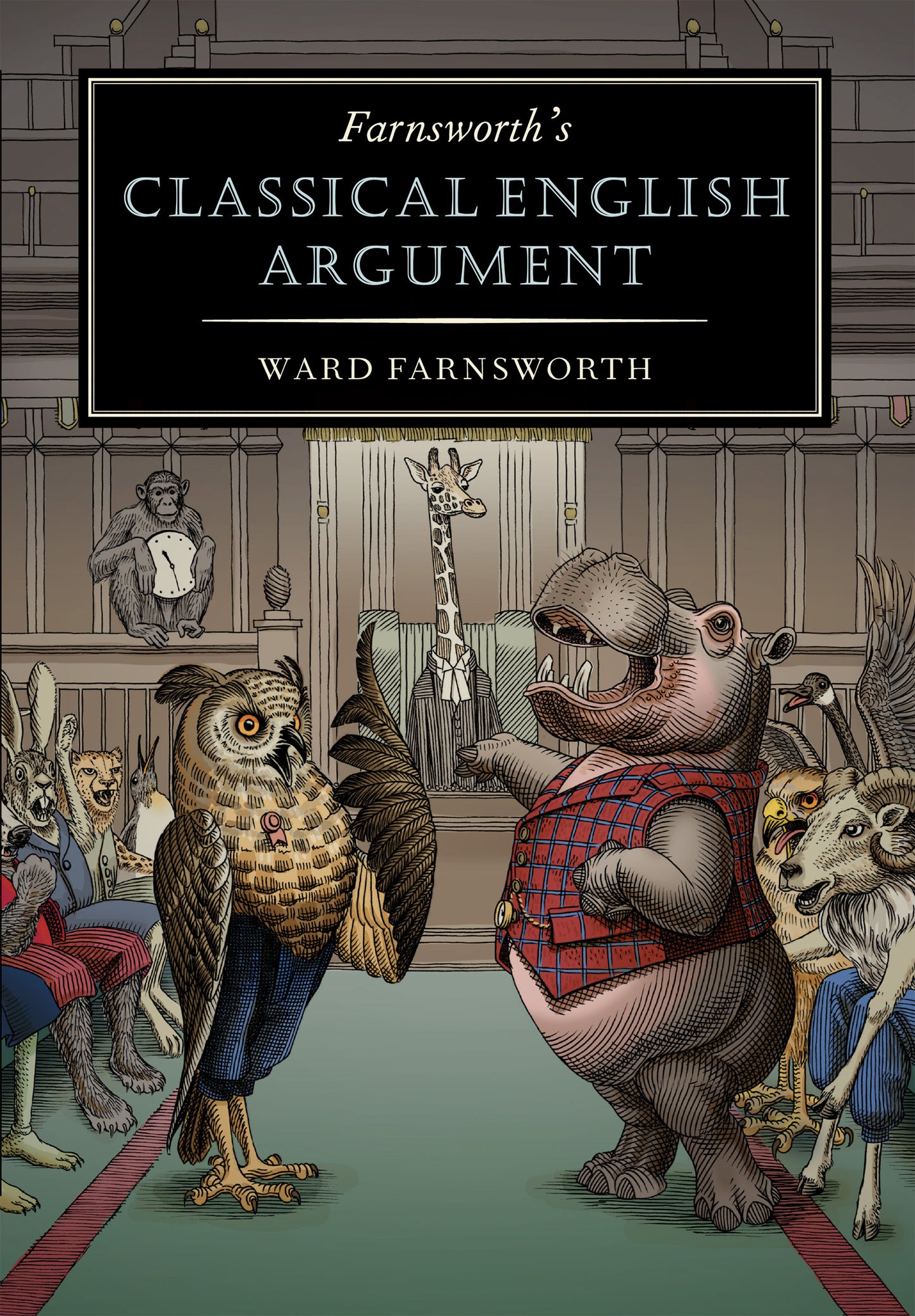
Learn how to argue from the masters. This book is a complete course on the art of argument, taught by the greatest practitioners of it: Churchill, Lincoln, and hundreds of others from the golden age of debate in England and America.
The book’s concise chapters provide lessons in all aspects of give and take—the syllogism and the slippery slope, the argumentum ad hominem and reductio ad absurdum, the fallacy and the insult. Ward Farnsworth shows how the full range of such techniques can be used or repelled, and illustrates them with examples that are fascinating, instructive, and fun to read.
The result is a browsable reference in which every page is a pleasure. It will leave you better able to win arguments and to defend yourself under fire. It’s also an entertaining reminder that argument can be a source of beauty and delight. As Farnsworth says of the illustrations, they show talented advocates “crossing analytical swords and exchanging abuse when those things were done with more talent and dignity than is common today. They made argument a spectator sport of lasting value and interest.”
Farnsworth’s Classical English Argument is the fourth book in a series about the ideas and methods embedded in the best speech and writing of an earlier time. Previous titles in the series are Farnsworth’s Classical English Rhetoric, Farnsworth’s Classical English Metaphor, and Farnsworth’s Classical English Style. Each book is a treasury of insight and an essential reference for all users of language.
Farnsworth’s Classical English Style
“An eloquent study of the very mechanisms of eloquence.” —Henry Hitchings
“A great and edifying pleasure.” —Mark Helprin “A storehouse of effective writing, showing the techniques you may freely adapt to make music of your own.” —The Baltimore Sun
“For writers aspiring to master the craft, Farnsworth shows how it’s done. For lovers of language, he provides waves of sheer pleasure.” —Steven Pinker
Farnsworth’s Classical English Rhetoric
“I must refrain from shouting what a brilliant work this is (præteritio). Farnsworth has written the book as he ought to have written it – and as only he could have written it (symploce). Buy it and read it – buy it and read it (epimone).” —Bryan A. Garner, Garner’s Modern English Usage
“The most immediate pleasure of this book is that it heightens one’s appreciation of the craft of great writers and speakers. Mr. Farnsworth includes numerous examples from Shakespeare and Dickens, Thoreau and Emerson, Winston Churchill and Abraham Lincoln. He also seems keen to rehabilitate writers and speakers whose rhetorical artistry is undervalued; besides his liking for Chesterton, he shows deep admiration for the Irish statesman Henry Grattan (1746-1820), whose studied repetition of a word (‘No lawyer can say so; because no lawyer could say so without forfeiting his character as a lawyer’) is an instance, we are told, of conduplicatio. But more than anything Mr. Farnsworth wants to restore the reputation of rhetorical artistry per se, and the result is a handsome work of reference.” —Wall Street Journal
Farnsworth’s Classical English Metaphor
“Ward Farnsworth is a witty commentator…It’s a book to dip in and savor.” —The Boston Globe
“Most people will find it a grab-bag of memorable quotations, an ideal browsing book for the nightstand.” —The Washington Post
“I want this book to be beside my bed for years to come, a treasure-house of the liquid magic of words.” —Simon Winchester
“A feat of elegant demystification…Farnsworth is able to focus on the finite material of metaphorical referents…a brilliant strategy, both in its utility for writers and the inherent insight Farnsworth’s divisions suggest about metaphors.” —The Millions
PRAISE FOR ADDITIONAL TITLES BY THE INVALUABLE FARNSWORTH
“Amid 21st-century rancor, a voice from ancient Athens offers an alternative: truth and a little humility....None should be discouraged from seeking out this remarkable book. By presenting the Socratic method as invitingly as it does, it eases the daunting task of taming the fanatical, irrational, censorious beasts in the American political zoo.” —Wall Street Journal
“Learned, erudite, and elegant.” —The Millions
“The Socratic method decelerates reasoning, making space for deliberation when disagreements arise. So, the Socratic method is, Farnsworth says, an antidote to some social pandemics of our day.” —George F. Will
“As befits a good Stoic, Farnsworth’s expository prose exhibits both clarity and an unflappable calm… Throughout The Practicing Stoic, Farnsworth beautifully integrates his own observations with scores of quotations from Epictetus, Seneca, Marcus Aurelius, Montaigne and others. As a result, this isn’t just a book to read—it’s a book to return to, a book that will provide perspective and consolation at times of heartbreak or calamity.” —The Washington Post
“It is reported that upon Seneca’s tomb are written the words, Who’s Minding the Stoa? He would be pleased to know the answer is Ward Farnsworth.” —David Mamet
“This is a book any thoughtful person will be glad to have along as a companion for an extended weekend or, indeed, for that protracted journey we call life.” —The New Criterion

